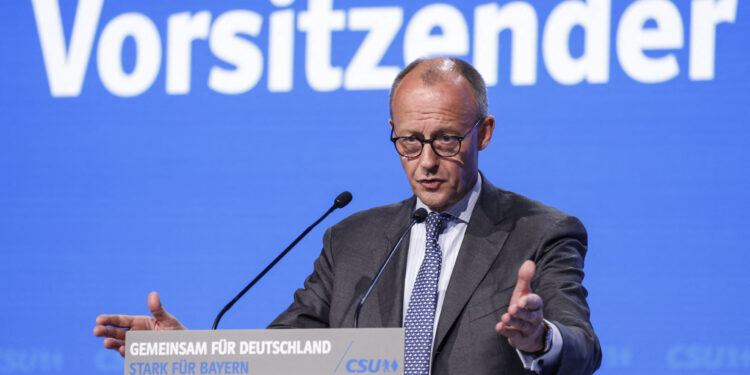Brussels – Less than three weeks before the elections, in Germany, the debate is more heated than ever about the collapse of the “cordon sanitaire” that has prevented any political collaboration with the far right since the end of World War II. The gamble by Friedrich Merz, the conservative leader in all likelihood destined to become the next federal chancellor, to try to win a parliamentary vote with AfD support has triggered cross-criticism from other parties and set in motion mass street protests. However, as the ultra-right leader’s popularity grows, the Christian Democrats’ approval rating among voters drops (slightly).
Last week was particularly intense for German politics, some 20 days before the early elections for the Bundestag on Feb. 23. According to polls, it will bring the Christian Democratic Union (CDU/CSU) back to power after the decidedly lackluster interregnum of the “Traffic Light coalition” led by outgoing Social Democratic Chancellor Olaf Scholz.
Backstory: On Jan. 29, Friedrich Merz‘s party succeeded in narrowly passing two non-binding motions calling for a vigorous crackdown on irregular immigration, thanks to the decisive support of MPs from Alternative für Deutschland (AfD), the xenophobic and pro-Russian post-Nazi ultra-right. A couple of days later, due to the defection of a handful of rebellious conservative MPs, the Bundestag refused to pass those motions into law, dealing a severe blow to the line the likely future chancellor has decided to take on the migration issue.

But it was like opening Pandora’s box. After the widespread condemnations of Merz from all sides of the political spectrum–including the friendly fire of several members of his party, notably from Angela Merkel — for undermining 80 years of collective efforts by German democratic forces since 1945 to keep the radical right out of the perimeter of power after the horrors of the Third Reich, mass protests also erupted.
Crowds of protesters poured into all major cities, and, in Berlin, at least 160 thousand citizens marched from the Bundestag to the headquarters of the CDU holding anti-AfD placards and chanting slogans against Merz’s move, deemed dangerous to the resilience of German democracy. In response, the leader of the Christian Democrats did nothing better than taking it out on his fellow citizens who responded to the mobilization, accusing them of hypocrisy.
“I say to all those who were out yesterday: you picked the wrong date and the wrong issue,” he said in the aftermath of the marches, drawing an awkward comparison between anti-AfD demonstrations and those against anti-Semitism which, he says, would not be as well attended: “Where is the revolt of decent people,” he wondered, in the face of “an unprecedented hatred of Israel” that “makes us deeply ashamed” but “against which the reaction has been too hesitant?”

However, the outrage over the flirtation with the ultra-right may already have caused concrete effects: according to the first survey following the events, the Chancellor’s Party (Chancellor’s Party) lost two percentage points in virtual voter approval, dropping from 30 to 28 percent, while the AfD remains firmly in second place with 20 percent. Similarly, Merz’s personal approval rating dropped three points to 22 percent, on par with the Greens’ chancellor candidate (as well as outgoing Economy Minister) Robert Habeck.
On the other hand, the biggest beneficiary of the latest developments has undoubtedly been Alice Weidel, the AfD co-leader who has now been at the center of German and European news for weeks thanks to her “blessing” of Elon Musk. The right-hand man of US President Donald Trump — the owner of X, SpaceX, and Tesla, as well as the wealthiest man in the world — sent shivers down the spines worldwide by performing a double Nazi salute at the inauguration ceremony of his new boss, thanking the fan base of the so-called “MAGA people,” the very same group that stormed the Capitol on Jan. 6, 2021.
After the failure of the vote in the House, Weidel did not miss the opportunity to mock the Christian Democratic leader, saying it implies “the dismantling of Friedrich Merz as chancellor candidate” and “the implosion” of the Chancellor’s party, stressing that in the AfD, “there are no dissidents who stab a legitimate cause in the back.”
Looking forward to your visit, @Alice_Weidel!
Berlin has always been a city of walls. It’s time to tear another one down!https://t.co/2uwsP03mmd– Viktor Orbán (@PM_ViktorOrban) February 3, 2025
Ahead of the ballot box appointment, the co-president of the German ultra-right received an invitation to Budapest next week, where she will meet Hungarian Prime Minister Viktor Orbán, who did not spare attestations of esteem for her. “Berlin has always been a city of walls. It’s time to tear down another one,” the Hungarian premier wrote yesterday on X.
Although part of two different political groups in Europe, Orbán and Weidel – members respectively of the Patriots for Europe (PfE) and the Europe of Sovereign Nations (ESN) – share, among other things, a profound hostility towards immigrants, especially those of the Muslim faith, and an ambiguous closeness with Vladimir Putin‘s Russia, with which they hope to resume political and economic relations as soon as possible.
English version by the Translation Service of Withub







